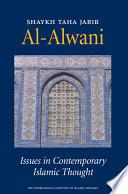
Issues in Contemporary Islamic Thought
This collection of papers presents a reformist project calling upon Muslim intellectuals and scholars everywhere to comprehend the vast breadth and depth of the crisis engulfing Muslim thought today and the necessity of solving this crisis to enable the Ummah to experience a revival and fulfill its role among the nations of the world. The reader will find a variety of articles dealing with this intellectual crises, these include a chapter on ijtihad's role and history, important since our intellectual problems cannot be solved without the scholars' use of independent reasoning and creativity. Another discusses imitation (taqlid) calling upon Muslim scholars and intellectuals to abandon imitation and to stop favoring the past over the present when trying to solve modern problems. Another looks at human rights.
- ISBN 13 : 1565645499
- ISBN 10 : 9781565645493
- Judul : Issues in Contemporary Islamic Thought
- Pengarang : Taha Jabir Al-Alwani,
- Kategori : Religion
- Penerbit : IIIT
- Bahasa : en
- Tahun : 2005
- Halaman : 317
- Google Book : https://play.google.com/store/books/details?id=RF8zyv0QH8UC&source=gbs_api
-
Ketersediaan :
This collection of papers presents a reformist project calling upon Muslim intellectuals and scholars everywhere to comprehend the vast breadth and depth of the crisis engulfing Muslim thought today and the necessity of solving this crisis ...









